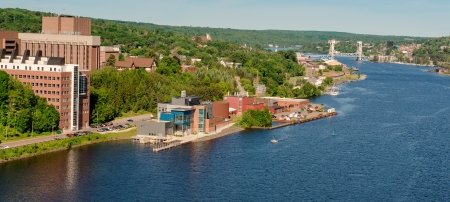Removing viruses like SARS-CoV-2, the novel coronavirus, from wastewater is important. So too is treating wastewater to remove parasitic worms, which affect more than 1 billion people worldwide.
In the last several years, Jennifer Becker and Eric Seagren, environmental engineers at Michigan Technological University, have developed treatment methods for biosolids, which are produced during wastewater treatment and often spread on land to improve soil quality and plant growth. Their sustainable, low-cost and low-tech methods can be utilized in smaller communities with relatively few wastewater treatment plant operators and resources, as well as in developing countries where wastewater treatment facilities are extremely limited.

“When you propose a new biosolids treatment technology in the US, you must be able to establish that the treatment methods will consistently reduce the concentrations of human intestinal viruses and bacteria like E. coli by three orders of magnitude,” Becker said. “Because of the strict food safety measures, and the quality of our water and wastewater treatment infrastructure in the US, we do not see another type of human intestinal pathogen, parasitic worms, in wastewater or biosolids.”
However, Becker says that in order for a biosolids treatment technology to be approved in the US, research must also show that new processes can reduce the load of parasitic worms by two orders of magnitude. This protective measure is just in case — because if, for example, someone becomes infected with these parasitic worms in a location where they are prevalent, and then travels to the US, they could shed the eggs of these worms in their feces. And it turns out that the eggs of parasitic worms are much hardier than intestinal bacteria and viruses, and are very difficult to kill off.
“The fact that US biosolids regulations ensure that even these very resilient life forms will be inactivated if they find their way into wastewater should make people confident about the safety of biosolids land application,” Becker said, adding that unfortunately, parasitic worms such as the roundworm Ascaris lumbricoides are endemic in many parts of the world. Around 1 billion people are infected with this organism worldwide.
“Infection with Ascaris and other parasitic worms causes so much hardship for folks," she said. "The worms take so much nutritional value away from the infected individuals, many of whom do not have adequate food supplies to begin with. These worms are especially harmful to children and have even been shown to affect cognitive development.”
Advancing wastewater treatment to remove chronic issues like parasitic worms has prepared Becker to rise to new challenges. She is part of a team using similar methods to track the SARS-CoV-2 virus in biosolids as well.

Michigan Technological University is an R1 public research university founded in 1885 in Houghton, and is home to nearly 7,500 students from more than 60 countries around the world. Consistently ranked among the best universities in the country for return on investment, Michigan's flagship technological university offers more than 185 undergraduate and graduate degree programs in science and technology, engineering, computing, forestry, business, health professions, humanities, mathematics, social sciences, and the arts. The rural campus is situated just miles from Lake Superior in Michigan's Upper Peninsula, offering year-round opportunities for outdoor adventure.






Comments